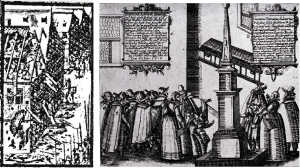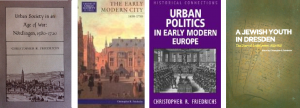1. GERMAN JEWISH HISTORY.
One of my current research interests involves the use of memoirs, letters and diaries to examine social networks and patterns of acculturation among German Jewish men of the nineteenth and twentieth centuries. In particular, I recently published the diary of a young Jewish bank apprentice in Dresden in the 1830s, with notes and commentary, as A Jewish Youth in Dresden: The Diary of Louis Lesser, 1833-1837 (University Press of Maryland, 2011). Associated with the diary was a handwritten literary journal produced by the diarist and three of his friends, the Akrothinia.
For more information about the Akrothinia and images of its pages, click here. For higher-resolution images of the same pages, click on the tab for ‘Akrothinia.’
I am currently studying family structures and naming practices in the Jewish community of Dresden between 1815 and 1850. I also hope to engage in some research on the life and career of Rabbi Solomon Herxheimer (1801-1884), based in part on his letters and household journal.
2. HOUSE-DESTRUCTION AS A FORM OF PUNISHMENT.
In recent years I have been engaged in a small research project on house-razing as an extension of punishment for serious crimes in early modern Europe. Papers presenting my findings have been presented at the conference of the Renaissance Society of America and at many universities. An article embodying this research will be published in 2021 in the European History Quarterly.
3. COMPARATIVE URBAN HISTORY.
After many years devoted chiefly to working on the social and political history of cities in early modern Germany and Europe, in 2003-2004 I undertook a comparative study of urban political cultures in early modern Europe and Asia. In connection with this project I was awarded a Shastri Indo-Canadian Institute faculty training grant to spend three months in India during the fall of 2003. From February to June 2004 I continued my work on this project as a Visiting Fellow at the Shelby Cullom Davis Center for Historical Studies at Princeton University. Two papers embodying the main findings of this research have been published and are listed below under “Selected Articles.”
PRINCIPAL PUBLICATIONS
Books
Urban Society in an Age of War: Nördlingen, 1580–1720 (Princeton, NJ: Princeton University Press, 1979), 350 pp.
The Early Modern City, 1450–1750 (London and New York: Longman, 1995), 381 pp.
Urban Politics in Early Modern Europe (London: Routledge, 2000), 89pp.
(Editor) A Jewish Youth in Dresden: The Diary of Louis Lesser, 1833-1837 (Bethesda, MD: University Press of Maryland, 2011), 239 pp.
Selected Articles
“Capitalism, Mobility and Class Formation in the Early Modern German City,” Past and Present, no 69 (November 1975), 24–49.
“Politics or Pogrom? The Fettmilch Uprising in German and Jewish History,” Central European History, 19 (1986), 186–228.
“Anti-Jewish Politics in Early Modern Germany: The Uprising in Worms, 1613–17”, Central European History, 23 (1990), 91–152.
“Urban Politics and Urban Social Structure in Seventeenth-Century Germany,” European History Quarterly, 22 (1992), 187–216.
“But Are We Any Closer to Home? Early Modern German Urban History since German Home Towns,” Central European History, 30 (1997), 163-85.
Jüdische Jugend im Biedermeier: Ein unbekanntes Tagebuch aus Dresden, 1833-1837 (Leipzig: Simon-Dubnow-Institut fur jüdische Geschichte und Kultur, 1997), 22 pp. Reprinted in Stefi Jersch-Wenzel and Günther Wartenberg, eds., Annäherungen: Beiträge zur jüdischen Geschichte und Kultur im Mittel- und Osteuropa (Leipzig: Leipziger Universitäts-Verlag, 2002), pp. 115-132.
“Jewish Household Structure in an Early Modern Town: The Worms Ghetto Census of 1610,” The History of the Family: An International Quarterly, 8 (2003), 481-93.
“The European City Hall as Political and Cultural Space, 1500-1750,” in Philip Benedict and Myron P. Gutmann, eds., Early Modern Europe: From Crisis to Stability (Newark, Del.: University of Delaware Press, 2005), 234-58.
“Das städtische Rathaus als kommunikativer Raum in europäischer Perspektive,” in Johannes Burkhardt and Christine Werkstetter, eds., Kommunikation und Medien in der Frühen Neuzeit, (Historische Zeitschrift, Beiheft N.F. 41; Munich: Oldenbourg, 2005), 159-74.
“Urban Transformation? Some Constants and Continuities in the Crisis-Challenged City,” in Troels Dahlerup and Per Ingesman, eds., New Approaches to the History of Late Medieval and Early Modern Europe (Copenhagen: Royal Danish Academy of Sciences and Letters, 2009), pp. 253-72.
“What Made the Eurasian City Work? Urban Political Cultures in Early Modern Europe and Asia,” in Glenn Clark, Judith Owens and Greg T. Smith, eds., City Limits: Perspectives on the Historical European City (Montreal and Kingston: McGill-Queen’s University Press, 2010), 29-64.
“Urban Elections and Decision-Making in Early Modern Europe and Asia: Contrasts and Comparisons,” in Rudolf Schlögl, ed.,Urban Elections and Decision-Making in Early Modern Europe, 1500-1800 (Newcastle upon Tyne: Cambridge Scholars Publishing, 2009), 300-21.
C. R. Friedrichs, “Leisure and Acculturation in the Jewish Community of Dresden, 1833-1837”, Leo Baeck Institute Year Book, vol. 56 (2011), pp. 1-26.
C. R. Friedrichs, “How German Was the German Home Town?”, Central European History, 47 (2014), pp. 488-495.
C.R. Friedrichs, “House-Destruction as a Ritual of Punishment in Early Modern Europe,” European History Quarterly, 50 (2020), pp. 599-624.
Selected Articles about Teaching
“The First-Year History Course: The Case for Content,” The History and Social Science Teacher, 24 (1988-89), 128-31.
“Teaching the Unteachable: A Canadian Perspective,” in Franklin H. Littell, G. Jan Colijn, Marcia Sachs Littell and Irene G. Shur, eds., The Holocaust: Remembering for the Future, Annals of the American Academy of Political and Social Science, 548 (Nov. 1996), 94–104.
Honours
Wallace K. Ferguson Prize (Canadian Historical Association),1982 for Urban Society in an Age of War
Killam Teaching Award (UBC), 1997
Just Desserts Award, UBC Alma Mater Society, 2006
Teaching
In recent years I taught History 102 (World History from 1500 to the Twentieth Century), History 103 (World History since 1900, formerly History 125), History 436 (European Social History, formerly History 316), History 413 (The Reformation), History 462 (Europe, 1900-1945) and numerous Honours and graduate courses. I have supervised master’s theses and doctoral dissertations on various aspects of European history, including German social and urban history, German Jewish history, and early modern British social history.
Due to my retirement on June 30, 2018, I will not be teaching any more undergraduate or graduate courses.
Like all university teachers, I was always concerned that students should understand the importance of giving credit for insights and information they draw on in constructing and defending their own arguments. To see my personal guide to correct footnoting (Footnotes: A Guide for the Perplexed), click on the Footnote Guide link above.



